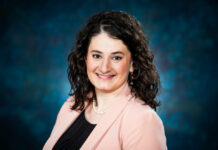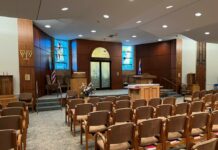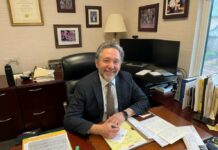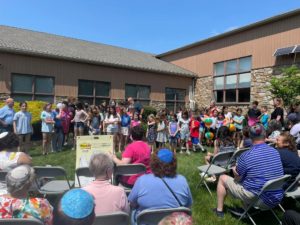
Rabbi Shelley Goldman arrived at Kesher Israel Congregation in West Chester in July 2020. One month later, the pandemic forced the synagogue to become a virtual institution.
So for much of her first two years, Goldman has led a digital community. Now, though, she is finally getting to build a congregation in person.
And her core principle at the formerly Orthodox, then Conservative and now unaffiliated synagogue is clear: Bring together the traditional and cultural contingents of the 220-family congregation.
“It’s a community that has a robust commitment to religious practice and a real commitment and love for the cultural practice of Judaism,” the rabbi said.
There is no real divide between those two groups. They coexist peacefully. They just have different Jewish priorities and preferences for different types of activities.
That’s why, coming out of the pandemic, Goldman is working on adding activities that can attract all types of congregants. Naturally, she is starting with meals, as nothing brings Jews together quite like eating.
In March, Goldman and synagogue officials opened their Pottstown Pike building for members to come together and break bread again. Since then, they’ve enjoyed meals during religious school, oneg Shabbats and lunch and learns with the rabbi, among other dining events.
“Our first strategy is having a theme of face-to-face,” Goldman said.
They plan on continuing that theme. Rachel Mussaf, the congregation’s education director, said that Rabbi Goldman wants to broaden the idea of what adult education looks like.
Kesher Israel has added a book club and a human sexuality class. In the fall, Goldman will teach her class about exploring “hot topics” through a Jewish lens. Such topics might include environmentalism and gender identity. Sessions may focus on exploring Jewish topics, like Kashrut, through a modern lens.
Also in the fall, the synagogue will revamp its Hebrew high school into a collaboration with other Chester County synagogues. It will include field trips, community service programs and social activities.
“It’s excellent,” Goldman said of the temple’s program expansion so far. “I never wanted to work primarily online.”
Congregants actually started coming back together about a year ago when services and school became hybrid. But now, they are transitioning back to what feels more like an in-person institution, instead of a hybrid or virtual one, according to Goldman.
While specific in-person programs enhance that feeling, it’s really about being together again, sans masks and other restrictions. Mussaf, who started in her position three years ago, noticed a new energy in the Hebrew school this past year.
Kids were together in the same room, smiling and laughing. They were not dreading being in school, either. They wanted to be there with their friends.
“It really brought tears to my eyes,” she said.
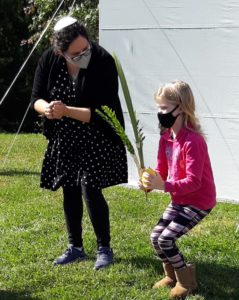
As Kesher Israel returns to in-person life, its foundation remains strong.
Its membership of 200-plus families has held steady through the remote pandemic years. Its religious school student body fell to 42 during that period but grew back up to 65 last summer. The temple coordinates between eight and 12 bar and bat mitzvahs per year, according to Mussaf.
Yet perhaps no aspect of synagogue life reflects Kesher Israel’s strong foundation more than its commitment to tradition at Shabbat services. Those services on Friday nights and Saturday mornings are long; they include a lot of Hebrew and a full reading of the seven aliyot.
At the same time, even before the pandemic, congregants were committed to moving away from tradition where appropriate, according to Goldman. KI of West Chester left the United Synagogue of Conservative Judaism, the North American organization for Conservative synagogues, in 2015, then embraced musical instruments on Shabbat and intermarriage.
Today, it still tries to take a progressive approach where appropriate, according to the rabbi. The temple’s annual Shabbat service under the summer sky event in June turned into a celebration of Pride Month this year. Goldman, who is gay herself, read quotes from famous LGBTQ+ people between prayers to introduce each new prayer.
“Glimpses from people who are speaking about their identities and making the world a better place,” she said.
Goldman sees this balance between tradition and progress as the future of Kesher Israel. She also believes that it’s a future people will believe in, and Mussaf agrees.
Both women expect Kesher Israel’s congregation to grow in the coming years.
Mussaf thinks “people want community more than ever now.”
“They are looking for that in synagogue walls,” she added.
“I think that we’re working on stabilizing and then hopefully growing,” the rabbi said. JE



